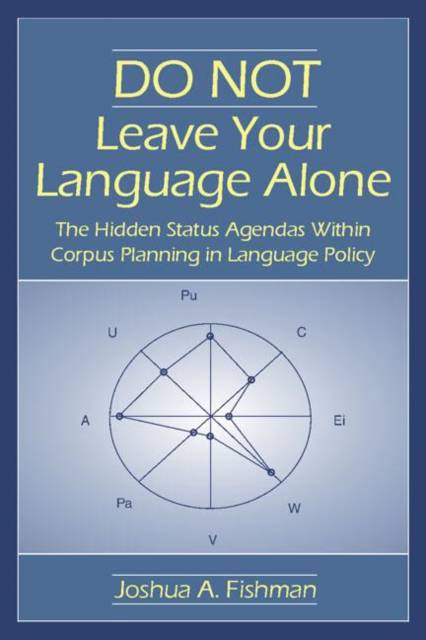
- Retrait gratuit dans votre magasin Club
- 7.000.000 titres dans notre catalogue
- Payer en toute sécurité
- Toujours un magasin près de chez vous
- Retrait gratuit dans votre magasin Club
- 7.000.0000 titres dans notre catalogue
- Payer en toute sécurité
- Toujours un magasin près de chez vous
Do Not Leave Your Language Alone
The Hidden Status Agendas Within Corpus Planning in Language Policy
Joshua a Fishman
Livre relié | Anglais
274,95 €
+ 549 points
Format
Description
This book, focused on corpus planning in language policy, provides a broad, integrative framework and also discusses multiple languages in detail. It provides readers with great familiarity with a wide range of language cases and at the same time gives them the theoretical tools and analysis to see how they inter-relate.
The novelty of this volume is twofold: First, it deals with corpus planning alone (modernizing a language per se), and second, it does so in terms of a systematization of the often unconscious language status aspirations that both guide language planners themselves and motivate the lay public (the target population of all language planning). Corpus planning is going on all over the world today and inevitably becomes an expression of the societal goals, ideologies, and aspirations of the societies and cultures that support it. The implication is that the distinction between corpus and status planning, which has a long tradition in language planning research, must be critically re-examined. DO NOT Leave Your Language Alone: The Hidden Status Agendas Within Corpus Planning in Language Policy begins with a brief introduction to language planning as a whole, to corpus planning in particular, and to the unavoidability of a status component in the execution of all corpus planning past, present, and future. Topics of the central chapters include:*corpus planning and status planning: separates, opposites, or Siamese twins?;
*the directions and dimensions of corpus planning;
*does "folksiness" come before or after "cleanliness"?;
*the bi-polar dimension of uniqueness vs. Westernization;
*the classicization vs. "panification" bi-polar dimension;
*the Ausbau vs. Einbau bi-polar dimension;
*the interdependence and independence of dimensional clusters; and
*can opposites and incommensurables be combined? Written at an introductory level assuming no prior knowledge of the field, this book is intended as a text for higher undergraduate and lower graduate level courses in language planning and policy. It is equally valuable for researchers in the field of language planning, policy, and politics, as well as those in sociolinguistics, political science, and communication studies more generally--that is, for all who are interested in fostering or limiting human intervention in the language change processes that are ongoing worldwide. Finally, an introduction to corpus planning that is full of historical vignettes, good humor, visual illustrations, and cutting-edge thought!
Spécifications
Parties prenantes
- Auteur(s) :
- Editeur:
Contenu
- Nombre de pages :
- 170
- Langue:
- Anglais
Caractéristiques
- EAN:
- 9780805850239
- Date de parution :
- 07-03-06
- Format:
- Livre relié
- Format numérique:
- Genaaid
- Dimensions :
- 152 mm x 229 mm
- Poids :
- 399 g

Les avis
Nous publions uniquement les avis qui respectent les conditions requises. Consultez nos conditions pour les avis.






